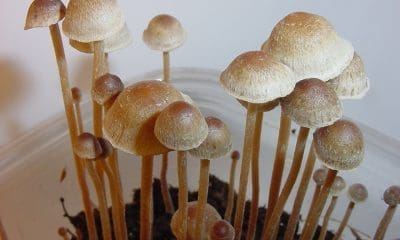Politics
California Governor Newsom Vetoes Psychedelics Legalization, But Calls For New Bill On Therapeutic Access Next Year
The governor of California has vetoed a bill to legalize certain psychedelics and create a pathway to regulated access—a move that comes at a time when two states have already enacted comprehensive psychedelics policy reform and as two campaigns are working to put the issue on California’s 2024 ballot.
Gov. Gavin Newsom (D)—who was one of the most prominent and earliest lawmakers to call for an end to the war on drugs as mayor of San Francisco and later push for the legalization of cannabis as lieutenant governor of California—vetoed the bill, SB 58, from Sen. Scott Wiener (D) on Saturday.
In a veto message, the governor caveated that he wants the legislature to send him a new bill next year establishing guidelines for regulated therapeutic access to psychedelics and also consider a “potential” framework for broader decriminalization in the future. But at this stage, he’s unwilling to let the reform be enacted with his signature.
“Both peer-reviewed science and powerful personal anecdotes lead me to support new opportunities to address mental health through psychedelic medicines like those addressed in this bill,” Newsom said in a veto message on Saturday. “Psychedelics have proven to relieve people suffering from certain conditions such as depression, PTSD, traumatic brain injury, and other addictive personality traits. This is an exciting frontier and California will be on the front-end of leading it.”
“California should immediately begin work to set up regulated treatment guidelines—replete with dosing information, therapeutic guidelines, rules to prevent against exploitation during guided treatments, and medical clearance of no underlying psychoses,” he continued. “Unfortunately, this bill would decriminalize possession prior to these guidelines going into place, and I cannot sign it.”
“I urge the legislature to send me legislation next year that includes therapeutic guidelines. I am, additionally, committed to working with the legislature and sponsors of this bill to craft legislation that would authorize permissible uses and consider a framework for potential broader decriminalization in the future, once the impacts, dosing, best practice, and safety guardrails are thoroughly contemplated and put in place.”
The governor’s veto comes as a severe disappointment to supporters, including military veterans and first responders who spent the session testifying in favor of the reform. The bill that was sent to Newsom’s desk already represented a watered down reform compared to a version Wiener filed last session, with certain psychedelics excluded from the adult-use possession and cultivation legalization provisions and regulated access left up to a workgroup who would have needed to study the issue and submit legislative recommendations to lawmakers by 2025.
“This is a setback for the huge number of Californians—including combat veterans and first responders—who are safely using and benefiting from these non-addictive substances and who will now continue to be classified as criminals under California law,” Wiener said in a statement.
Gov Newsom vetoed SB 58, our bill to decriminalize mushrooms & other naturally occurring psychedelics.
So for now, folks who benefit from these non-addictive substances remain classified as criminals under CA law.
Our fight is not over. We’ll be back with legislation next year. pic.twitter.com/Dehiz9mG0K
— Senator Scott Wiener (@Scott_Wiener) October 7, 2023
“The evidence is beyond dispute that criminalizing access to these substances only serves to make people less safe and reduce access to help,” he said. Today’s veto is a huge missed opportunity for California to follow the science and lead. This is not the end of our fight, however, and given the Governor’s commitment to work with the Legislature on legislation with a therapeutic focus—and openness to future decriminalization legislation—I look forward to introducing therapeutic-focused legislation next year.”
After Wiener’s last version moved through the Senate, it was significantly diluted in the Assembly, becoming essentially a study bill that he ultimately pulled from consideration.
Newsom’s thinking on psychedelics policy issues has been somewhat opaque. He was asked about Wiener’s bill last month, and at the time he said that he understood the “profound” therapeutic impact of psychedelics for people with conditions such as post-traumatic stress disorder. But he said that fatherhood has given him a different perspective on drug policy reform.
The veto might seem difficult to square in light of Newsom’s prior support for marijuana legalization—as well as harm reduction policies like syringe exchange programs in San Francisco and his longtime rhetorical criticism of the war on drugs broadly—but it also comes in the context of a potential presidential bid. While the governor hasn’t announced plans to run, he’s taken the national spotlight—with a scheduled debate with 2024 GOP presidential candidate Florida Gov. Ron DeSantis (R) next month.
Newsom also vetoed another progressive drug policy bill from Wiener last session. It would have created a pilot program for overdose prevention sites in California—a measure advocates insisted would save lives. The governor declined to put his signature on the bill, and suspicions about a potential connection to his possible presidential aspirations were raised.
Wiener’s now-vetoed psychedelics bill would have legalized the possession and personal cultivation of certain entheogenic plants and fungi for adults starting on January 1, 2025. A workgroup would have been established under the California Health and Human Services Agency (CHHSA) to study and make recommendations on establishing a regulatory framework to access the substances for therapeutic and facilitated use.
The legislation was amended in several ways this session in the Assembly after clearing the Senate. For example, ibogaine was removed from the list of drugs that would be legal to possess and cultivate. The possession limit was also reduced as from amounts in the original Senate bill, and the effective date of the legalization provisions were pushed back until 2025 to give the workgroup time to develop recommendations for a regulatory framework.
The “allowable amount” section of the bill as amended would have allowed for the following psychedelics possession limits:
- Mescaline: 4 grams
- DMT: One gram
- Psilocybin: One gram, or up to one ounce of “a plant or fungi containing psilocybin”
- Psilocyn: One gram, or up to one ounce of “a plant or fungi containing psilocyn.”
It also said that adults could have possessed an “amount of spores or mycelium capable of producing an allowable amount of a plant or fungi which contain a controlled substance” that would have been legalized under the bill.
Beside personal possession and cultivation being legalized, the bill would have also specifically provided for “community-based healing” involving the entheogenic substances. It previously included “group counseling” as well, but an author’s amendment that was adopted in June removed all references to counseling. It also made a series of technical changes to clean up the legislation.
The legislation’s provisions around the transfer of covered psychedelics without remuneration were also recently revised, making it so people could have shared the substances within the context of therapeutic or facilitated use. Advocates had hoped that gifting would be more broadly legalized outside of regulated settings, but it appears that would have remained prohibited without further legislative action.
This marks the second time that Wiener has championed psychedelics legalization legislation after an earlier version passed the Senate but stalled out in the Assembly last session. Unlike that prior version, this latest bill excluded synthetic psychedelics like LSD and MDMA from the list of substances that would be legalized and focused only on those that are derived from plants or fungi.
When the prior version of the legislation was in jeopardy near the end of the 2022 session, Wiener sought to make a deal to save it by removing synthetics in an attempt to shift law enforcement organizations from being opposed to neutral on the bill. That move was opposed by advocates and ultimately did not produce a passable proposal.
Peyote was also excluded from the bill’s legalized substances list, which is responsive to concerns raised by some advocates and indigenous groups about the risks of over-harvesting the vulnerable cacti that’s been ceremonially used.
The veto from Newsom comes as activists with two separate campaigns work to put psychedelics reform on the state’s 2024 ballot.
—
Marijuana Moment is tracking more than 1,000 cannabis, psychedelics and drug policy bills in state legislatures and Congress this year. Patreon supporters pledging at least $25/month get access to our interactive maps, charts and hearing calendar so they don’t miss any developments.
![]()
Learn more about our marijuana bill tracker and become a supporter on Patreon to get access.
—
California officials cleared a campaign this summer to begin signature gathering for a 2024 ballot initiative to legalize the possession, sale and regulated therapeutic use of psilocybin. It’s one of two campaigns in the state that are seeking to enact psychedelics reform through the ballot process next year.
“Unfortunate but not unexpected,” Ryan Munevar, campaign manager of Decriminalize California, told Marijuana Moment.
Another California campaign filed a proposed initiative for the state’s 2024 ballot this summer that would create a $5 billion state agency tasked with funding and promoting psychedelics research that it hopes will accelerate federal legalization of substances like psilocybin and ibogaine.
Newsom did recently separately sign legislation that would allow doctors to immediately start prescribing certain currently illicit drugs like psilocybin and MDMA if they’re federally rescheduled.
The governor signed off on the measure—which is just one of more than a dozen cannabis and drug policy reform proposals lawmakers recently sent to his desk—late last month.
Elsewhere in the U.S., Colorado Gov. Jared Polis (D) signed a psychedelics regulation bill into law in May, setting rules for a psychedelics legalization law that voters passed last year.
Oregon voters approved a ballot initiative to legalize psilocybin services in 2020. This spring, regulators there accepted the nation’s first state-licensed facilitators to administer psilocybin to adults at the regulated facilities, as well as a testing laboratory for the psychedelic. Regulators also approved the first-ever state-issued license for a psilocybin manufacturer in March.
















